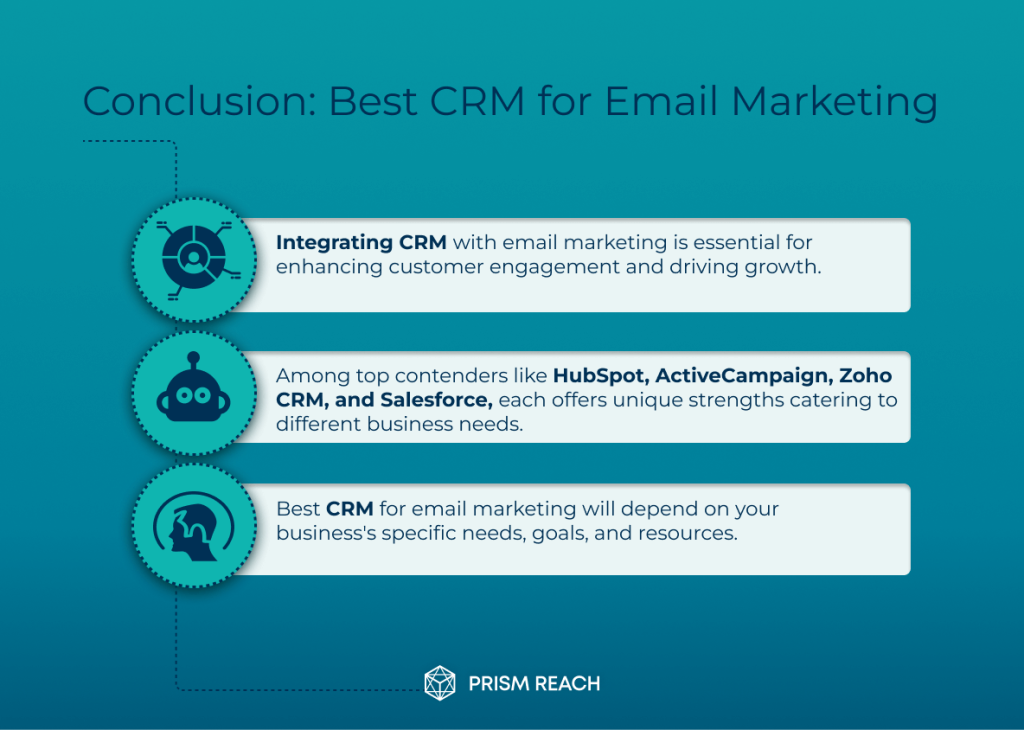In today’s digital landscape, businesses are constantly seeking ways to streamline their operations, enhance customer engagement, and drive growth. One powerful strategy that has emerged as a game-changer is the integration of customer relationship management (CRM) systems with email marketing platforms. By combining the strengths of these two essential tools, companies can unlock a wealth of opportunities to nurture leads, build lasting relationships, and boost conversions. However, choosing the best CRM for email marketing requires careful consideration of features, ease of use, and the ability to integrate innovative strategies that can significantly enhance your campaigns. In this comprehensive guide, we’ll explore the top CRM solutions for email marketing, integrate five “hidden gems” strategies to elevate your email marketing effectiveness, and highlight the unique benefits of Prism Reach, an AI-powered solution designed to revolutionize your email marketing efforts.
Key Facts
- The best CRMs for email marketing offer advanced automation, segmentation, and personalization features tailored for marketers.
- Top CRMs integrate seamlessly with popular email marketing tools and platforms, enhancing workflow efficiency.
- Innovative strategies like behavior-based automation and AI-powered personalization can significantly boost engagement and conversion rates.
- Choosing the right CRM involves evaluating factors such as pricing, ease of use, customer support, and specific feature sets that align with your marketing goals.
- AI-driven solutions like Prism Reach provide unparalleled personalization and automation capabilities, setting them apart from traditional CRMs.
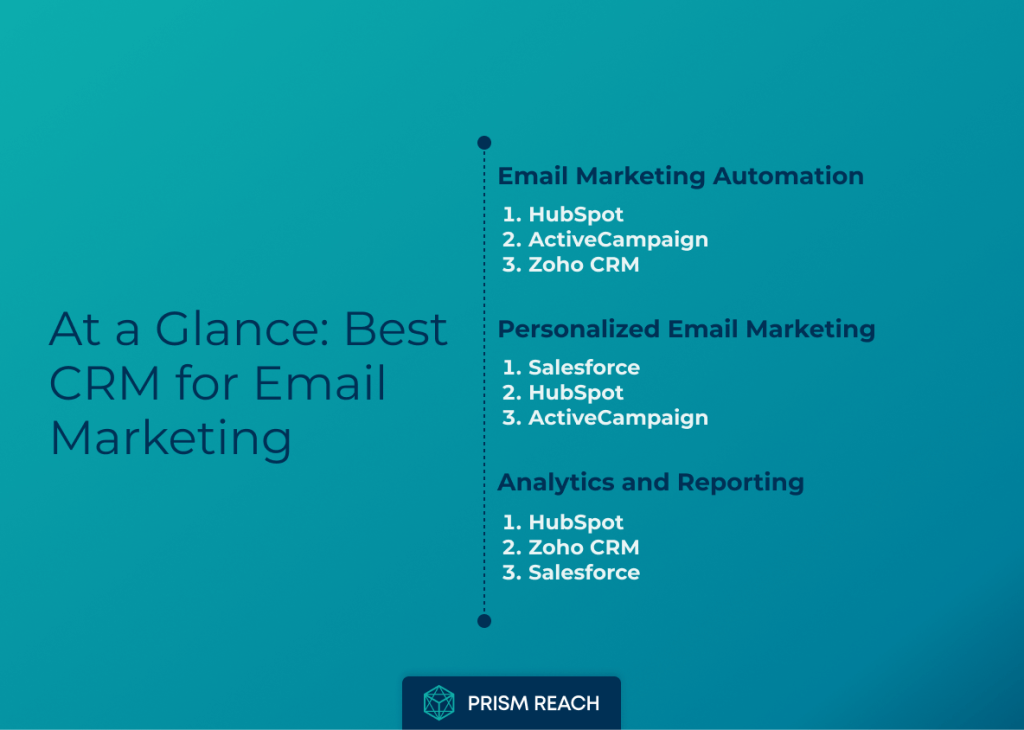
Upgrade Your Email Marketing with AI Personalization!
Best CRM Solutions for Email Marketing
HubSpot
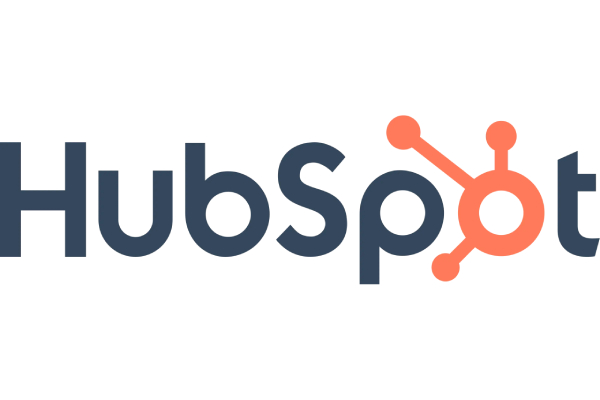
Pros:
✅ Manage up to one million contacts.
✅ Send 2,000 emails monthly for free.
✅ User-friendly interface.
✅ Advanced marketing automation.
✅ Comprehensive sales funnel management.
Cons:
❌ Limited email template customization.
❌ Lower email deliverability rates.
ActiveCampaign
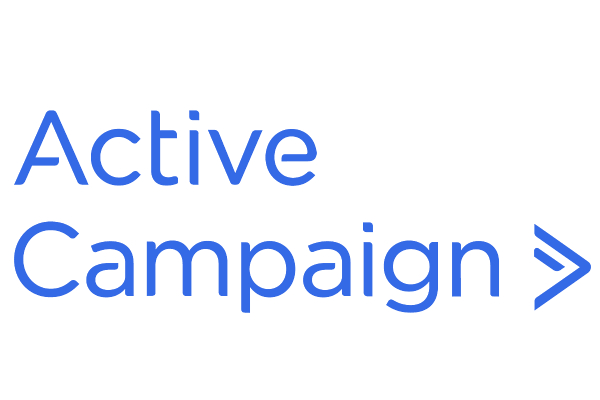
Pros:
✅ Sophisticated email marketing automation.
✅ High email deliverability rates.
✅ Robust reporting and analytics tools.
✅ Behavioral triggers for personalization.
✅ Extensive CRM integration capabilities.
Cons:
❌ Higher cost for small businesses.
❌ Steep learning curve for new users.
Zoho CRM
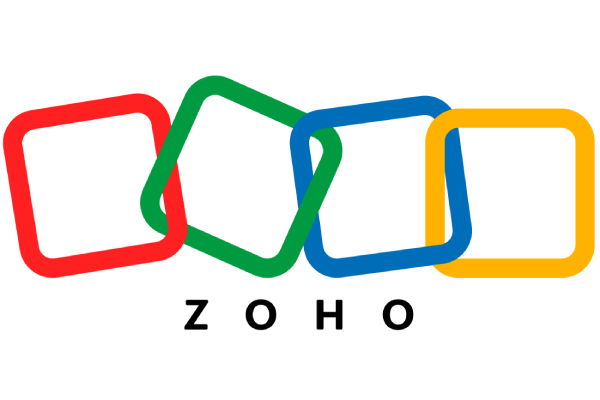
Pros:
✅ User-friendly interface suits all business sizes.
✅ Flexible pricing with a free version available.
✅ Extensive options for customization.
✅ AI-driven analytics provide deep insights.
✅ Automated workflows enhance efficiency.
Cons:
❌ Advanced features need additional Zoho apps.
❌ Enterprise plan costly for small businesses.
Salesforce
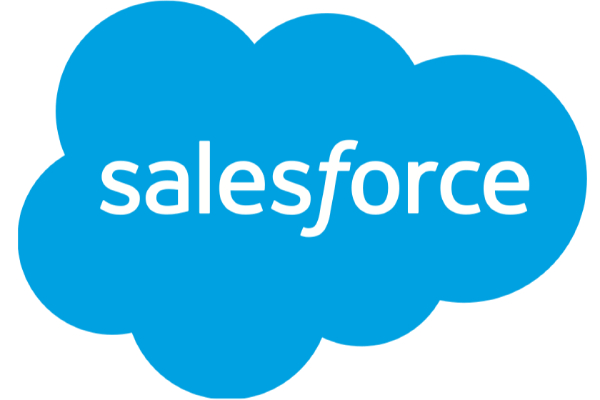
Pros:
✅ Highly scalable for any business size.
✅ Advanced email customization options.
✅ In-depth analytics and campaign insights.
✅ Integration with numerous third-party apps.
✅ Robust lead capture and management.
Cons:
❌ Higher cost compared to competitors.
❌ Complex customization process.
Selecting the best CRM for your email marketing needs can significantly impact your campaign’s success. Below are some of the top CRM solutions that stand out for their features, ease of use, and effectiveness in driving email marketing performance.
1. HubSpot: The All-in-One Marketing Powerhouse
HubSpot emerges as a top contender for businesses seeking a comprehensive CRM with powerful email marketing automation capabilities. With its intuitive drag-and-drop workflow builder, users can easily create complex automation sequences that nurture leads and drive conversions. HubSpot’s advanced segmentation tools allow for highly targeted campaigns based on customer data, ensuring that the right message reaches the right audience at the optimal time.
Key Features:
- Intuitive drag-and-drop workflow builder for creating automated email sequences.
- Advanced segmentation and personalization based on comprehensive customer data.
- Seamless integration across all HubSpot hubs, including sales, service, and CMS.
- Comprehensive analytics and reporting tools for tracking campaign performance.
- Extensive library of email templates and customization options.
Pricing: HubSpot offers a free tier with basic CRM functionalities. Paid plans start at $45/month for the Starter plan, scaling up to more comprehensive packages as your business grows.
Unique Benefits:
- Seamless integration with other HubSpot tools, providing a unified platform for all marketing needs.
- Robust analytics and reporting to track and optimize campaign performance.
- High scalability, making it suitable for businesses of all sizes.
- Extensive customer support and educational resources.
2. ActiveCampaign: Dynamic Automation and CRM Integration
ActiveCampaign is a leading email autoresponder known for its powerful automation and CRM capabilities. It allows affiliate marketers to create complex, behavior-based email sequences that nurture leads through personalized content. ActiveCampaign excels in its ability to integrate with various affiliate marketing platforms, making it a versatile choice for driving affiliate sales.
Key Features:
- Advanced segmentation and personalization based on user behavior.
- Integrated CRM for managing affiliate relationships and tracking conversions.
- Visual automation builder for creating detailed email sequences.
- Machine learning capabilities for predictive sending and content recommendations.
- Robust reporting and analytics to monitor campaign performance.
Pricing: Plans start at $15/month for up to 500 contacts, with advanced features available in higher-tier plans.
Unique Benefits:
- Seamless integration with major affiliate marketing platforms.
- Robust analytics and reporting to track campaign performance.
- High deliverability rates ensuring your emails reach the inbox.
- Comprehensive customer support and extensive knowledge base.
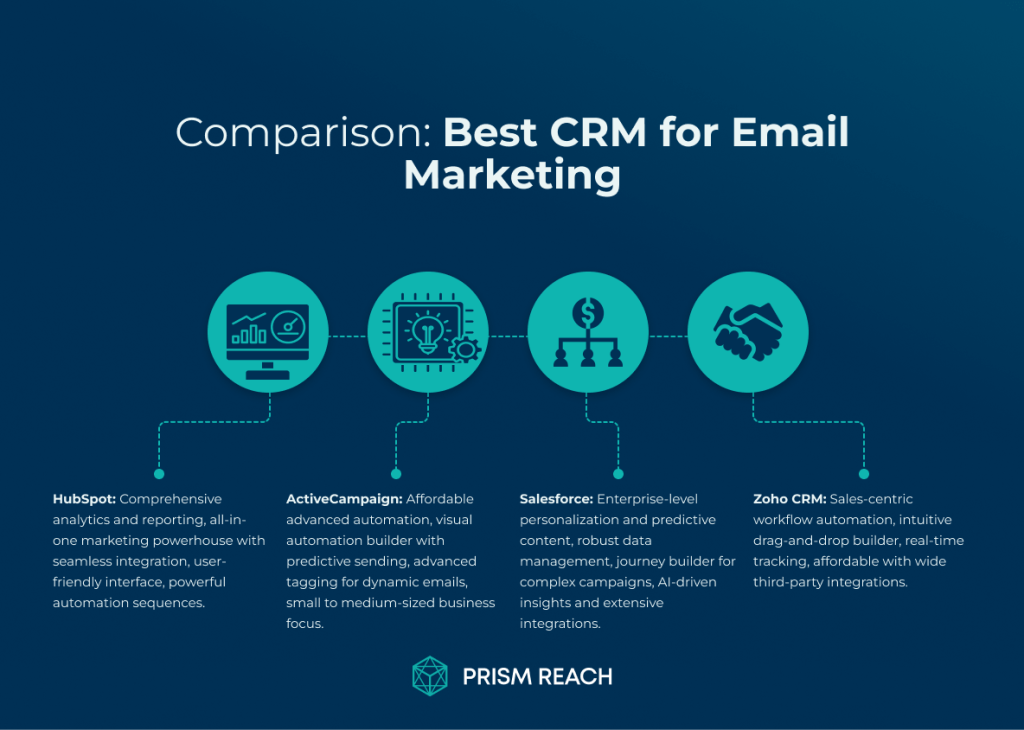
3. Salesforce: Enterprise-Level CRM with Powerful Email Marketing
Salesforce is renowned for its enterprise-level CRM capabilities, offering robust features that cater to large organizations and complex email marketing needs. Its extensive customization options and powerful analytics make it a top choice for businesses looking to integrate advanced CRM functionalities with their email marketing strategies.
Key Features:
- Comprehensive customer data management and segmentation.
- Advanced automation tools for creating personalized email campaigns.
- Einstein AI for predictive analytics and content recommendations.
- Integration with a vast array of third-party tools and platforms.
- Detailed reporting and analytics for performance tracking.
Pricing: Salesforce offers various pricing tiers starting at $25/user/month for the Essentials plan, scaling up to more comprehensive packages for larger enterprises.
Unique Benefits:
- Highly customizable to fit specific business needs and workflows.
- Powerful AI-driven insights and recommendations.
- Extensive third-party integrations for enhanced functionality.
- Scalable solutions suitable for large enterprises.
4. Zoho CRM: Streamlined Automation for Sales-Focused Teams
Zoho CRM stands out for its sales-centric features and workflow automation capabilities. With its intuitive drag-and-drop builder, teams can create multi-step email campaigns that align with their sales processes. Zoho CRM’s SalesSignals feature allows for real-time tracking of customer interactions, enabling timely and relevant email follow-ups.
Key Features:
- Intuitive drag-and-drop email campaign builder.
- Real-time tracking of customer interactions with SalesSignals.
- Advanced workflow automation to streamline email marketing efforts.
- Integration with Zoho’s suite of business tools for a unified platform.
- Comprehensive analytics and reporting for campaign optimization.
Pricing: Zoho CRM offers a free plan for up to 3 users. Paid plans start at $14/user/month for the Standard plan, with additional features available in higher-tier plans.
Unique Benefits:
- Affordability with robust features suitable for small to medium-sized businesses.
- Integration with a wide range of Zoho tools and third-party applications.
- Real-time tracking and automation for enhanced campaign efficiency.
- User-friendly interface with customizable dashboards.
5. Prism Reach: AI-Powered Personalization and Automation
While the top CRMs offer a range of features and services, Prism Reach stands out as an innovative AI-powered SaaS solution designed to enhance the effectiveness of email marketing campaigns through deep personalization. Prism Reach leverages advanced AI technology to create highly personalized newsletters, transforming how businesses engage with their audiences.
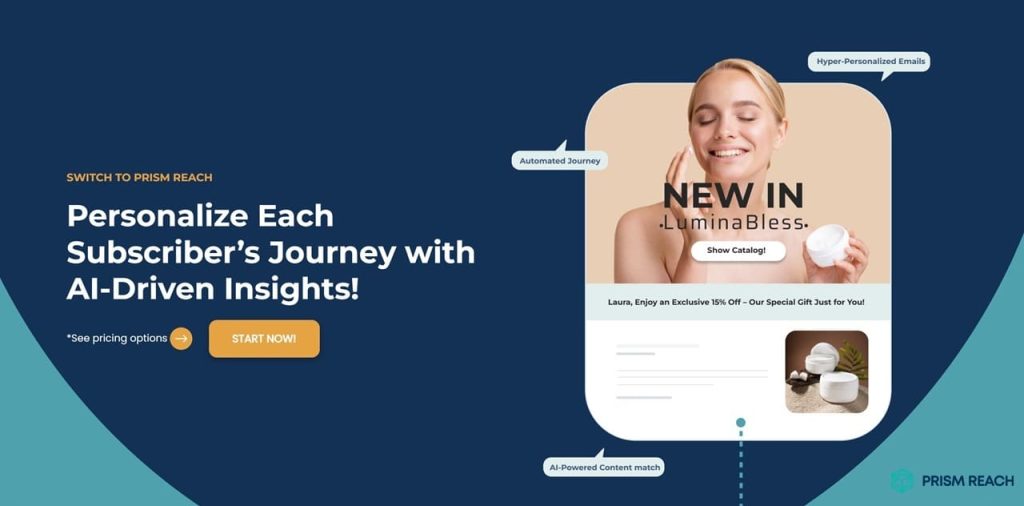
Key Features:
- AI-Powered Personalization: Customizes every aspect of newsletters based on subscriber behavior and preferences.
- Seamless Integration: Effortlessly integrates with existing CRM and marketing tools for unified customer data.
- Advanced Analytics and Reporting: Provides detailed insights into campaign performance and user engagement.
- Dynamic Content Selection: AI determines the most relevant content for each subscriber, enhancing personalization.
- Advertising and Swap Networks: Facilitates targeted advertising and mutual promotion among publishers.
Pricing: Prism Reach offers flexible pricing plans tailored to businesses of all sizes, along with a free trial to explore its features without any financial commitment.
Unique Benefits:
- AI-Powered Personalization ensures each email is highly relevant and engaging.
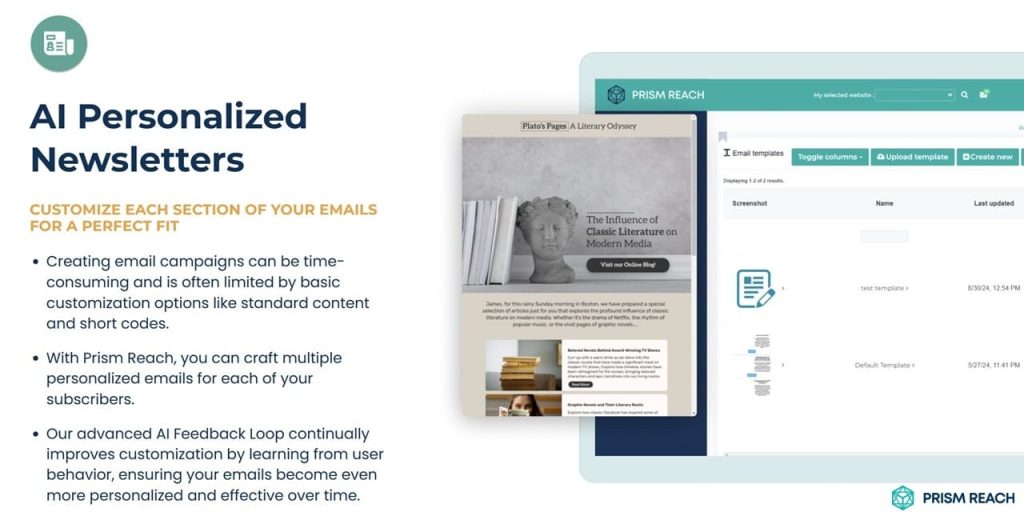
- Seamless Integration simplifies the setup process and unifies customer data.
- Advanced Analytics and Reporting provide actionable insights for continuous optimization.
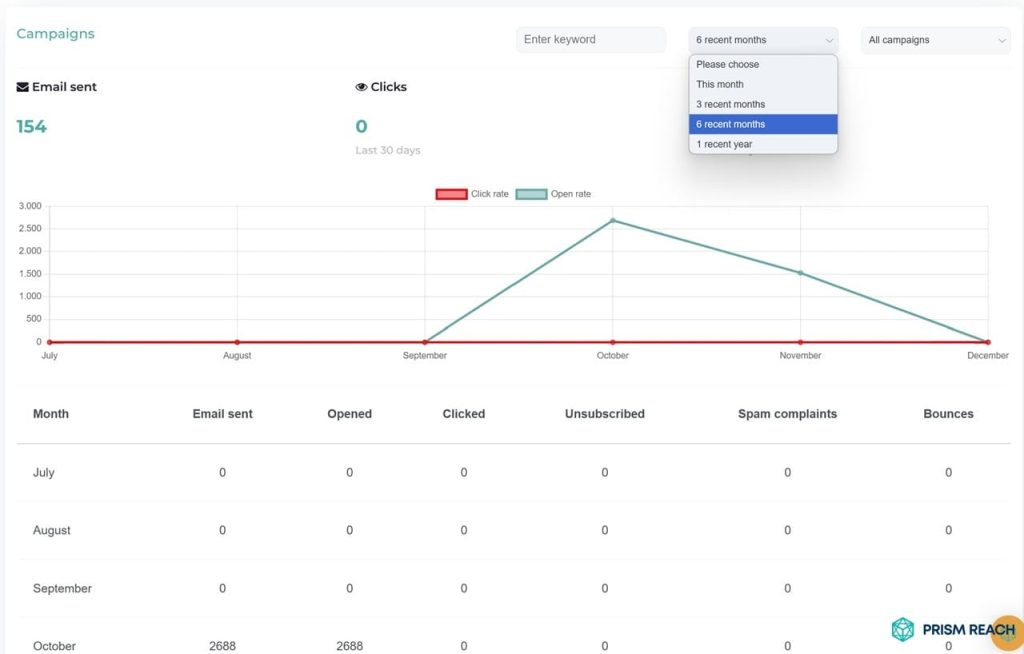
Hidden Gems: 5 Strategies to Enhance Your Email Marketing with CRM Solutions
To maximize the effectiveness of your CRM-integrated email marketing, it’s essential to implement innovative strategies that go beyond basic email campaigns. Here are five “hidden gems” strategies that can significantly enhance your email marketing effectiveness:
1. Leverage Predictive Analytics for Targeting
Utilize predictive analytics within your CRM to forecast customer behaviors and preferences. By analyzing historical data, you can identify which customers are most likely to engage with specific offers or products. This allows you to tailor your email campaigns more effectively, targeting high-potential leads and increasing conversion rates.
Implementation Tips:
- Integrate predictive analytics tools with your CRM to analyze customer data.
- Identify key indicators that predict customer engagement and purchasing behavior.
- Segment your email list based on predictive insights to target high-potential leads.
- Test and refine your predictive models to improve accuracy over time.
Benefits:
- Enhanced targeting of high-potential leads increases conversion rates.
- Improved ROI by focusing resources on the most promising segments.
- Data-driven insights enable more informed decision-making.
2. Create Multi-Touch Drip Campaigns
Instead of a single email blast, develop multi-touch drip campaigns that nurture leads over time. Use your CRM to automate a series of emails that educate, inform, and guide prospects through the sales funnel based on their interactions with previous emails.
Implementation Tips:
- Map out the customer journey to identify key touchpoints.
- Create a sequence of emails that provide value and build trust.
- Automate the drip campaign using your CRM’s workflow tools.
- Personalize each email based on the subscriber’s interactions and behavior.
Benefits:
- Builds a stronger relationship with leads through consistent, valuable communication.
- Guides prospects through the sales funnel, increasing the likelihood of conversion.
- Automated campaigns save time and ensure timely follow-ups.
3. Integrate Social Media Insights
Integrate social media data into your CRM to enhance customer profiles. By understanding how customers interact with your brand on social platforms, you can tailor your email marketing efforts to address their interests and behaviors more accurately.
Implementation Tips:
- Connect your social media accounts with your CRM to gather engagement data.
- Analyze social interactions to identify customer interests and preferences.
- Use this data to create more personalized and relevant email content.
- Segment your email list based on social media engagement for targeted campaigns.
Benefits:
- Enhanced customer profiles lead to more personalized and effective email campaigns.
- Increased relevance of email content based on social media interactions.
- Improved customer engagement and loyalty through tailored messaging.
4. Utilize Smart Alerts for Timely Engagement
Set up smart alerts in your CRM to notify you when subscribers engage with your emails (e.g., opening an email or clicking a link). This allows you to follow up promptly, enhancing customer engagement and increasing the likelihood of conversions.
Implementation Tips:
- Configure smart alerts for key engagement actions within your CRM.
- Define criteria for alerts to ensure you receive relevant notifications.
- Develop a follow-up strategy to act on these alerts in a timely manner.
- Integrate smart alerts with your sales or support teams for coordinated efforts.
Benefits:
- Timely follow-ups increase the chances of converting engaged leads.
- Enhanced customer experience through prompt and relevant interactions.
- Improved efficiency by automating notifications for high-priority actions.
5. Automate Segmentation Based on Behavior
Use your CRM’s automation capabilities to segment your email lists dynamically based on user behavior. For example, automatically categorize users who click on specific product links or engage with certain content types, allowing for more targeted messaging.
Implementation Tips:
- Define behavioral triggers that will initiate segmentation (e.g., clicks, opens, purchases).
- Set up automated workflows in your CRM to categorize subscribers based on these behaviors.
- Create tailored email content for each segment to address their specific interests.
- Regularly review and refine your segmentation criteria to ensure accuracy.
Benefits:
- Enhanced targeting leads to higher engagement and conversion rates.
- Personalized messaging increases the relevance of email content.
- Automated segmentation saves time and ensures up-to-date audience categories.
Why Choose Prism Reach?
While the top CRMs offer a range of features and services, Prism Reach stands out as an innovative AI-powered SaaS solution designed to enhance the effectiveness of email marketing campaigns through deep personalization. Prism Reach leverages advanced AI technology to create highly personalized newsletters, transforming how businesses engage with their audiences.
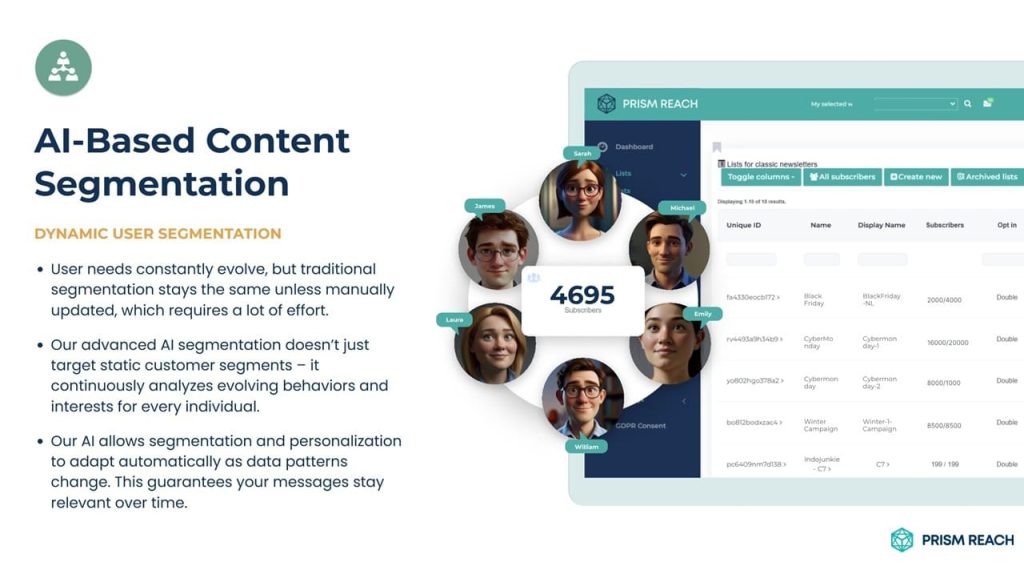
Three Potential Benefits of Prism Reach:
- AI-Powered Personalization: Prism Reach uses sophisticated AI algorithms to customize every aspect of newsletters based on subscriber behavior and preferences. This ensures that each email is highly relevant and engaging for the recipient.
- Seamless Integration: Prism Reach integrates effortlessly with existing CRM and marketing tools, simplifying the setup process and ensuring that all your customer data is unified for better segmentation and personalization.
- Advanced Analytics and Reporting: With detailed insights into campaign performance and user engagement, Prism Reach enables businesses to make data-driven decisions to continuously optimize their email marketing strategies.
How to Get Started with Prism Reach
Getting started with Prism Reach is straightforward, thanks to its user-friendly setup and seamless integrations. Here’s a simple guide to help you begin:
- Sign Up: Visit the Prism Reach website and sign up for a free trial to explore the platform’s features without any financial commitment.
- Integrate Your Tools: Connect Prism Reach with your existing CRM, eCommerce platforms, and other marketing tools to unify your customer data.
- Set Up Your Campaign: Use the drag-and-drop editor to create your first newsletter, leveraging AI-generated content suggestions and dynamic content blocks for personalization.
- Automate Your Workflows: Utilize Prism Reach’s advanced automation features to set up personalized email sequences based on subscriber behavior and preferences.
- Analyze and Optimize: Monitor your campaign performance through Prism Reach’s comprehensive analytics dashboard and make data-driven adjustments to improve results continuously.
Conclusion
Choosing the best CRM for email marketing is pivotal to the success of your campaigns. Whether you prioritize comprehensive features, ease of use, or advanced automation and personalization, there is a CRM solution that can meet your needs. The top solutions discussed in this article, including HubSpot, ActiveCampaign, Salesforce, Zoho CRM, and MailerLite, offer a range of features that can help you effectively engage your audience and drive email marketing performance.
However, for businesses seeking to leverage cutting-edge AI technology to create highly personalized and effective email campaigns, Prism Reach is the clear choice. By integrating Prism Reach into your email marketing strategy, you can harness the power of AI to deliver ultra-personalized content, automate complex workflows, and gain deep insights into your campaign performance. This innovative solution not only enhances engagement and conversion rates but also streamlines your marketing efforts, allowing you to focus on what matters most—growing your business.
Don’t miss out on the opportunity to revolutionize your email marketing with Prism Reach’s advanced capabilities. Explore the platform today and take your email marketing campaigns to new heights.
